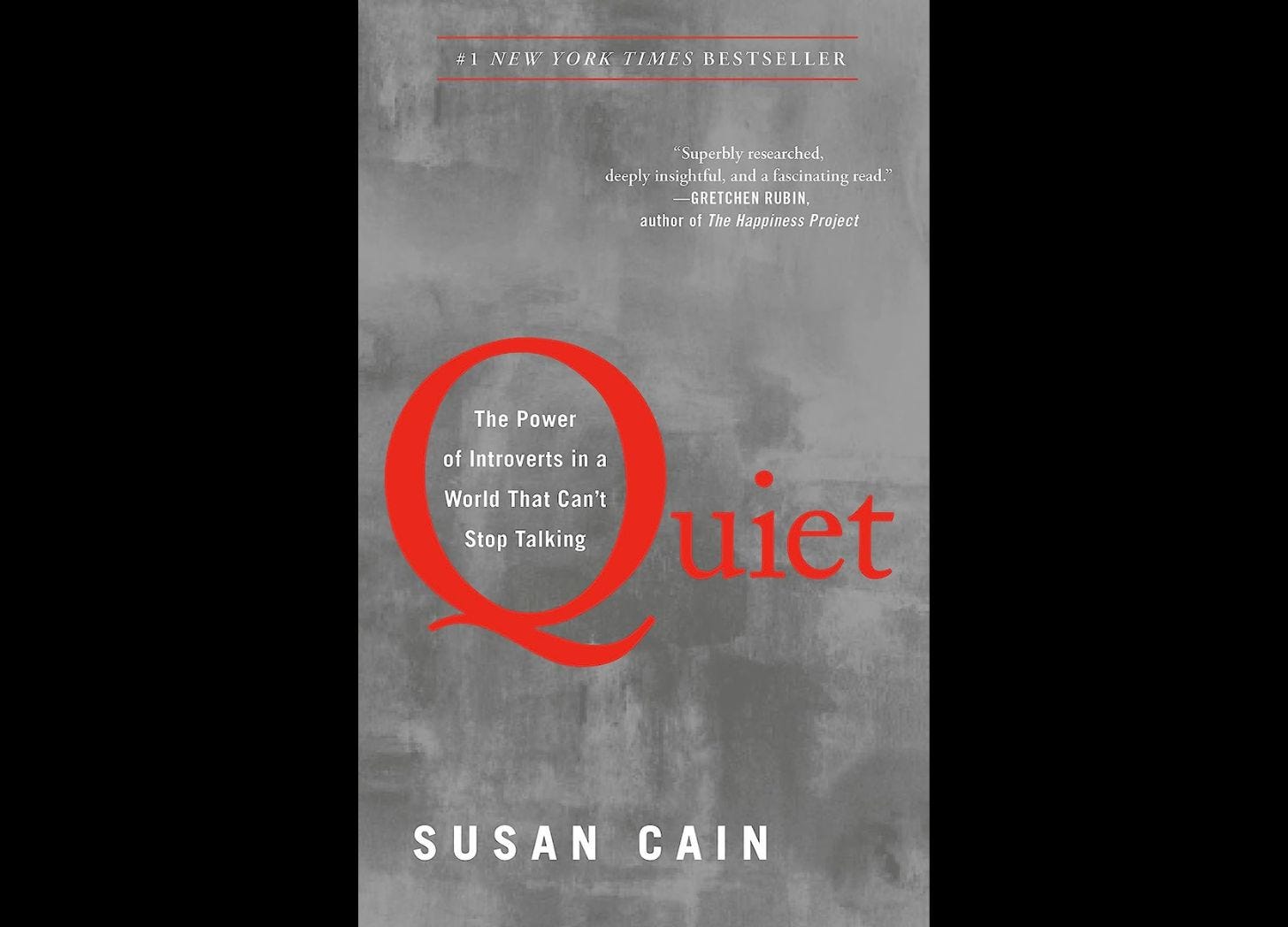📣 Curious Quotes from the Author:
“Open-plan offices have been found to reduce productivity and impair memory.”
“Peer pressure, in other words, is not only unpleasant, but can actually change your view of a problem.”
“Introverts, in contrast, may have strong social skills and enjoy parties and business meetings, but after a while wish they were home in their pajamas. They prefer to devote their social energies to close friends, colleagues, and family. They listen more than they talk, think before they speak, and often feel as if they express themselves better in writing than in conversation. They tend to dislike conflict. Many have a horror of small talk, but enjoy deep discussions.”
“There's zero correlation between being the best talker and having the best ideas.”
“The secret to life is to put yourself in the right lighting. For some, it's a Broadway spotlight; for others, a lamplit desk. Use your natural powers -- of persistence, concentration, and insight -- to do work you love and work that matters. Solve problems. make art, think deeply.”
“So stay true to your own nature. If you like to do things in a slow and steady way, don't let others make you feel as if you have to race. If you enjoy depth, don't force yourself to seek breadth. If you prefer single-tasking to multi-tasking, stick to your guns. Being relatively unmoved by rewards gives you the incalculable power to go your own way.”
“Introversion- along with its cousins sensitivity, seriousness, and shyness- is now a second-class personality trait, somewhere between a disappointment and a pathology. Introverts living in the Extrovert Ideal are like women in a man's world, discounted because of a trait that goes to the core of who they are. Extroversion is an enormously appealing personality style, but we've turned it into an oppressive standard to which most of us feel we must conform.”
“I worry that there are people who are put in positions of authority because they're good talkers, but they don't have good ideas. It's so easy to confuse schmoozing ability with talent. Someone seems like a good presenter, easy to get along with, and those traits are rewarded. Well, why is that? They're valuable traits, but we put too much of a premium on presenting and not enough on substance and critical thinking.”
#Sponsor
Have an Idea for a Digital Online Business? Start Now in just 5 easy steps, and we’ll guide you every step of the way:
📚 Cognition of the Book’s Big Idea:
There’s a lot of good material to unpack in this book. It’s almost a case study of Extroverts vs Introverts. The Author goes on to describe this battle:
Extroverts like noise and stimuli
Introverts like to think and be alone
Extroverts like thrive on collecting as many acquaintances as possible
Introverts like a handful of close friends
Extroverts like Small Talk
Introverts like Deep Discussions
Extroverts wear their heart on a sleeve and don’t care much for the feelings of others
Introverts are very sensitive to the feeling of those around them
There are many time when extroverts coerce the introvert into being more like them because they think that’s the best personality to hold, and introverts usually let them. A balance must be struck between the two, it would even be an interesting experiment to see co-managers working together, an introvert and extrovert.
Introverted children need the right environment to grow. They need quiet places to think and a supportive environment to flourish. Negativity is especially damaging to them, as they feel that a lot more than any extroverted child and depression can come faster to an introverted child than an extroverted one.
The world seems to place a higher regard for extrovert and their practices. Money, Fame and Friendship seem to follow them and reach them a lot easier. Different Cultures value different temperaments. A lot of the Asian cultures value introversion more in business dealings, while America follows and extroverted mindset
Extroversion began shifting as the default and best practice of personality types only about 150 years ago because…
back then everyone lived in small towns. When the big cities started to grow massively, all wealth and desire for knowledge start to accumulate in the cities. Competition became fierce with so many competing for the high profile jobs, extraversion became a necessity to “winning” those jobs. You can see this trend as it was developing within the advertising of the day. Bigger, bolder headlines and promises were made because they sold more newspapers, much like politics has become today, a lot of blustering and trying to prove my way is better than the other candidate.
Introverts can often act like extroverts when needed, but it drains their energy and can’t consistently keep it up for long. They’ll need recharge time somewhere quiet and alone for them to repeat that process.
The Author also suggests that workplaces shouldn’t tailor their design to extroverts. An open office floorplan is a horrible environment for Introverts. Interruptions and unfocused time abound. A lot of achievement was done in a quiet workshop among some of the biggest tech geniuses. Retractable walls are a great balance of both worlds.
🛠️For the Introverted
Miscommunication is common in interactions between introverts and extroverts. When there is a confrontation, extroverts tend to get angry and go on the attack, overpowering or overwhelming introverts. The typical introvert avoids open disagreement since it is uncomfortable, which the extrovert frequently sees as a lack of interest.
Only when both temperaments open up to one another and strive to comprehend the other's point of view will they be able to achieve great things together.
🤝 Collaborate with others with this Social Media Prompt:
What is one way you and your opposite personality type can come together and succeed in a certain collaboration? How can you both benefit from each other’s strength’s and help each other’s weaknesses?


